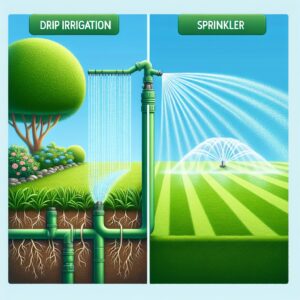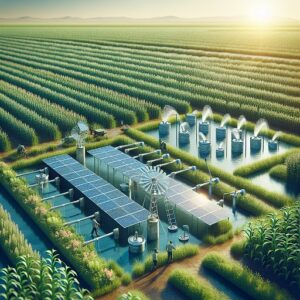
Key Takeaways
-
Sodium-sulfur batteries have a high energy density, ideal for large-scale solar irrigation systems.
-
High-efficiency flow batteries are emerging as a sustainable option with unique benefits for energy storage.
-
Comparing these batteries involves looking at energy density, lifespan, cost, temperature management, and environmental impact.
-
Real-world case studies illustrate the practical application and advantages of sodium-sulfur and flow batteries in agriculture.
-
Understanding the specific requirements and conditions of your farm is crucial for selecting the right battery for your solar-powered irrigation system.
Choosing the Right Battery for Your Solar-Powered Irrigation
When you’re powering your farm with the sun, you’ve got to store that sunshine for times when the clouds roll in or the sun sets. That’s where batteries come in. But not all batteries are created equal, and some are better suited for the heavy lifting required by solar-powered irrigation systems. Let’s dive into what makes a battery fit for this job and how to choose the best one for your needs.
Powering Up: Understanding Solar Irrigation
First things first: solar irrigation uses energy from the sun to power pumps that move water to your crops. It’s a clean and cost-effective way to keep your farm hydrated without relying on the grid or fossil fuels. But since the sun isn’t always shining, you need batteries to store energy for continuous water flow.
The Heart of the System: Battery Basics
Batteries are the backbone of any off-grid solar system. They store the energy collected by solar panels during sunny periods, and release it on demand, such as during the night or on cloudy days. The type of battery you choose impacts not just how much energy you can store, but also how efficiently your irrigation system runs.

Sodium-Sulfur Batteries: Powering Up Agriculture
Sodium-sulfur batteries are a bit like the unsung heroes of the battery world. They pack a lot of power into a relatively small package, which is great for when space is at a premium and you need a lot of energy on tap for things like running irrigation pumps.
How Do They Work?
These batteries operate at high temperatures, using molten sodium and sulfur to create an electrical charge. This might sound a bit like a science project, but it’s this unique chemistry that gives them a high energy density. That means they can store a lot of energy in a small space, which is perfect for farms that need a lot of juice but don’t have room for a huge battery bank.
Benefits That Sodium-Sulfur Batteries Brings to Your Fields
Sodium-sulfur batteries are not just about saving space. They also have a long lifespan and can discharge a lot of their stored energy, which is exactly what you need for those long irrigation cycles. Most importantly, they’re a sustainable choice, with a smaller environmental footprint than many traditional batteries.
But let’s break down the benefits:
-
High Energy Density: Store more energy per square foot, meaning you can power your pumps longer between charges.
-
Long Lifespan: Fewer battery replacements mean lower costs and less hassle over time.
-
Deep Discharge Capability: They can release a large amount of their stored energy, making them reliable even during longer periods without sunlight.
Therefore, when you’re thinking about the long game for your farm’s energy needs, sodium-sulfur batteries are a solid bet.
Challenges You Might Face With Sodium-Sulfur
Now, it’s not all sunshine and roses. Sodium-sulfur batteries do have some challenges. For starters, they’re more expensive up front than some other types. They also need to operate at high temperatures, which means they require insulation and energy to maintain that heat. Here’s a quick list of potential hurdles:
-
High Initial Investment: They can be pricey to purchase and install.
-
Temperature Requirements: Keeping them hot means using some energy just to maintain their operating conditions.
-
Special Handling: Because of their high operating temperatures, they need careful management and safety protocols.
But, if you’re looking at the bigger picture, the longevity and efficiency of sodium-sulfur batteries can make them worth the initial setup.

High-Efficiency Flow Batteries: The New Contender
As we move to more sustainable farming practices, it’s important to keep an eye on emerging technologies. High-efficiency flow batteries are one such innovation that’s beginning to make waves in agricultural energy storage. These batteries use liquid electrolytes that flow through a cell stack and can be charged and discharged simultaneously, which is a bit like having a battery with a never-ending supply of energy.
The Mechanics of High-Efficiency Flow Batteries
Imagine a battery where you can replace the fuel, just like filling up your car with gas. That’s essentially how flow batteries work. They store energy in liquid form, which means they can be recharged by replacing or replenishing the electrolyte solution. This unique feature could be a game-changer for farms, especially those that need a continuous and reliable power supply for their irrigation systems.
Advantages of Flow Batteries in Agriculture
Flow batteries have a few standout features that make them particularly appealing for farming operations This below table will list some of the Advatages:
|
Advantages of Flow Batteries in Agriculture |
Description |
|---|---|
|
Renewable Energy Integration |
Flow batteries allow agricultural operations to efficiently store energy generated from renewable sources such as solar or wind power. |
|
Peak Shaving |
By storing excess energy during periods of low demand and discharging it during peak hours, flow batteries help reduce electricity costs. |
|
Off-Grid Power |
Flow batteries provide reliable off-grid power solutions for remote agricultural operations, enabling irrigation and other essential tasks. |
|
Grid Stability |
Flow batteries contribute to grid stability by smoothing out fluctuations in energy supply and demand, enhancing overall reliability. |
|
Emergency Backup Power |
In the event of power outages, flow batteries serve as backup power sources, ensuring continuous operation of critical agricultural systems. |
|
Long Lifespan |
Flow batteries typically have long lifespans, reducing the frequency of replacements and maintenance, thus minimizing downtime for farmers. |
|
Scalability |
With scalable designs, flow batteries can be tailored to meet the energy storage needs of farms of various sizes, from small holdings to large estates. |
|
Quick Response Time |
Flow batteries offer quick response times, they can ramp up to full power almost instantly. This allowing for rapid discharge or charge as needed, ensuring timely energy supply adjustments for agricultural operations. |
Because of these benefits, flow batteries could be the perfect fit for farms looking to modernize their energy systems.
Considerations Before Choosing Flow Batteries
But, there are always two sides to every coin. Flow batteries are still a developing technology, and there are a few things to consider before jumping in:
-
Complexity: The system is more complex than traditional batteries, which can mean more things that could potentially need fixing.
-
Size: Even though they’re scalable, the initial setup can take up more space than other battery types.
-
Cost: As a newer technology, they can come with a higher price tag, both for the system itself and for potential repairs.
So, while flow batteries have a lot of potential, it’s important to weigh these considerations against your farm’s specific needs and resources.

The Showdown: Side-by-Side Comparison
Now, let’s put sodium-sulfur and high-efficiency flow batteries head-to-head to see how they stack up in a few key areas. This comparison will help you make an informed decision about which battery technology might be best for your solar-powered irrigation system.
Energy Density Comparison
Energy density is a big deal because it determines how much power you can store in a given space. Sodium-sulfur batteries are the heavyweights here, offering a high energy density that’s perfect for farms with limited space. Flow batteries, on the other hand, have a lower energy density, but their ability to scale up by simply adding more electrolyte could offset this disadvantage for larger operations.
Lifespan and Durability
The durability of your battery directly affects the reliability of your irrigation system. Sodium-sulfur batteries boast a long lifespan, often outlasting other types of batteries. Flow batteries, with their unique design, minimize wear and tear during charging and discharging, which can also lead to an extended lifespan.
Cost Analysis Over Time
While sodium-sulfur batteries may have a higher upfront cost, their long lifespan means you might save money in the long run. Flow batteries could offer savings too, due to their scalability and potential for lower operating costs. It’s crucial to consider not just the purchase price, but also the total cost of ownership over the years.
Cost Analysis Over Time
Sodium-sulfur batteries require high temperatures to operate, which can be energy-intensive to maintain. Flow batteries typically work at room temperature, which can simplify things and potentially reduce costs related to temperature control.
Environmental Impacts
Both battery types offer environmental benefits over fossil fuel-based energy sources. Sodium-sulfur batteries have a solid track record for being recyclable and having a lower environmental impact during their lifecycle. Flow batteries are also an eco-friendly option, particularly because their liquid electrolytes can often be reused or recycled.
This below table show other comparison between Sodium-Sulfur and High-Efficiency Flow batteries:
|
Feature |
Sodium-Sulfur Battery |
High-Efficiency Flow Battery |
|---|---|---|
|
Electrolyte |
Molten Sodium and Sulfur |
Aqueous electrolyte solution |
|
Cathode Material |
Sulfur |
Vanadium, Zinc-Bromine, or others |
|
Anode Material |
Sodium |
Vanadium, Zinc-Bromine, or others |
|
Operating Temperature |
High (typically 300-350°C) |
Moderate to low |
|
Energy Density |
High |
Moderate to high |
|
Power Density |
Moderate to high |
Moderate to high |
|
Cycle Life |
Moderate |
Long |
|
Efficiency |
Moderate (70-80%) |
High (80-90%) |
|
Cost |
Moderate to high |
Moderate to high |
|
Safety Concerns |
Fire risk due to high operating temps |
Chemical leakage risk |
|
Scalability |
Limited |
High |
|
Environmental Impact |
Emissions during manufacturing and use |
Potential chemical pollution |
|
Application |
Grid-scale energy storage |
Grid-scale energy storage |
This above comparison highlights the key differences between Sodium-Sulfur and High-Efficiency Flow batteries in terms of their electrolytes, materials, operating parameters, performance metrics, cost, safety, scalability, environmental impact, and application suitability.
Real-World Application: Case Studies
It’s always helpful to see how these technologies perform outside the lab, in the real world where factors like weather, soil, and water demand come into play. Let’s look at some case studies that show how sodium-sulfur and flow batteries are being used on farms today.
Case Study A: Sodium-Sulfur Success Stories
One farm in the sunny Southwest switched to sodium-sulfur batteries for their solar irrigation system and saw their water delivery become more reliable, even during peak summer months. The farmer noted that the batteries’ ability to discharge deeply meant that they could keep the pumps running longer, even on cloudy days.
Case Study B: High-Efficiency Flow Battery Innovations
In a different case, a large agricultural operation adopted flow batteries to complement their solar panels. They appreciated the system’s scalability, which allowed them to expand storage capacity easily as their operation grew. The farm manager reported a significant drop in their energy costs and a boost in their sustainability credentials.

Streamlining Your Solar-Irrigation Setup
Whether you go with sodium-sulfur or high-efficiency flow batteries, there are a few key steps to ensure your solar irrigation system runs smoothly:
-
Installation Insights: Work with experienced professionals who can design and install a system tailored to your farm’s needs.
-
Maintenance Tips: Stay on top of regular maintenance to extend the life of your batteries and prevent downtime.
-
Optimizing Battery Performance for Different Crops: Understand the water needs of your crops to better manage your battery usage and irrigation scheduling.
By taking these steps, you can maximize the efficiency and reliability of your solar-powered irrigation system, no matter which battery technology you choose.
Installation Insights
Installing your solar-powered irrigation system is like setting the foundation for a sustainable future. You want to get it right the first time. So, make sure you collaborate with professionals who are not just skilled in general installations but are also experts in renewable energy systems. They’ll consider the sun’s path, your land’s topography, and your water needs to tailor a system that’s efficient and effective. Remember, correct installation is crucial for optimal performance and longevity of your batteries and the entire system.
Maintenance Tips
Maintenance is key to keeping your solar irrigation system in top shape. For sodium-sulfur batteries, ensure they’re always at the right temperature and check for any insulation issues. With flow batteries, keep an eye on the electrolyte levels and the state of the membranes. Schedule regular check-ups, clean the solar panels, and keep the area around the batteries tidy to prevent overheating. A well-maintained system not only runs better but also prevents unexpected costs and headaches down the road.
Optimizing Battery Performance for Different Crops
Every crop has its own thirst level, and it’s your job to quench it efficiently. Start by understanding the water requirements of your crops throughout their growing cycles. Use this information to program your irrigation system, ensuring that it delivers the right amount of water at the right time, maximizing the use of your stored solar energy. Also, consider weather patterns and adjust your system accordingly to avoid water waste and ensure your batteries are used effectively.
By fine-tuning your system’s performance, you’ll not only save energy but also boost crop yields. And that’s what we’re aiming for—abundance without excess.
Frequently Asked Questions (FAQ)
As we embrace renewable energy solutions in agriculture, it’s natural to have questions about how these systems work and what to expect. Here are some of the most common questions about solar-powered irrigation batteries answered.
What Is the Expected Lifespan of These Batteries?
Sodium-sulfur batteries have an impressive lifespan, often exceeding 15 years with proper maintenance. Flow batteries also boast longevity, with some systems designed to last for over 20 years. Remember, the actual lifespan will depend on factors like usage patterns, maintenance, and environmental conditions.
Investing in quality batteries and taking good care of them will ensure you get the most out of your solar irrigation system for years to come.
How Does Temperature Affect Battery Performance?
Temperature plays a crucial role in battery performance. Sodium-sulfur batteries need to be kept hot, usually around 300°C, to function efficiently. On the flip side, if they get too hot, their lifespan could be shortened. Flow batteries are less sensitive to temperature changes but still perform best within a specified range, typically close to room temperature. It’s important to monitor and manage the temperature of your batteries to maintain optimal performance.
Most systems come with temperature management features, but it’s always good to stay informed and proactive about your batteries’ thermal environment.
Can These Batteries Be Scaled Up for Larger Farms?
Absolutely! One of the advantages of both sodium-sulfur and flow batteries is their scalability. For sodium-sulfur batteries, you can add more units to increase storage capacity. Flow batteries are even more flexible; you can scale up by simply increasing the volume of the electrolyte. This feature makes flow batteries particularly attractive for growing operations that anticipate an expanding need for energy storage.
Scaling up your battery system allows you to grow your farm sustainably, ensuring that your energy supply keeps pace with your agricultural demands.
What Are the Environmental Benefits of Using These Batteries?
Choosing sodium-sulfur or flow batteries for your solar-powered irrigation system is not just a smart economic decision; it’s a nod to environmental stewardship. These batteries are known for their lower environmental impact compared to traditional lead-acid batteries. They don’t contain heavy metals and are often recyclable, reducing your farm’s carbon footprint and contributing to a healthier planet.
By opting for these advanced battery technologies, you’re not only securing energy independence for your farm but also playing a part in the global movement towards a more sustainable future.
Are There Government Subsidies for Sustainable Farming Equipment?
Yes, many governments worldwide are offering subsidies and incentives for farmers who invest in sustainable technologies, including solar-powered irrigation systems and their batteries. These can come in the form of tax credits, grants, or low-interest loans. It’s worth checking with your local agricultural extension office or renewable energy programs to see what’s available in your area.
Conclusion: Which Battery is a Better Investment for the Farmer, the Sulfur or High-Efficiency Flow Battery
Both sodium-sulfur and high-efficiency flow batteries have their own unique strengths and weaknesses. For farmers, it ultimately comes down to their specific needs and budget. If budget is a major concern, sulfur batteries may be the better option due to their low cost and longer lifespan. But if a farmer has larger equipment and requires more power, a high-efficiency flow battery may be the better investment in the long run. Ultimately, it is important for farmers to carefully consider their options and choose the battery that best fits their specific needs and goals.






